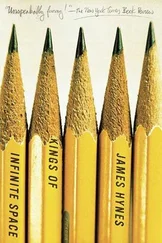He passes through the sliding doors into his first real embrace by the Texas heat. It’s not so bad; the air presses warmly against his skin, that’s all. Plus he’s in the shade of an overpass, under a ceiling of massive rectangular beams held up by squat, square pillars of dirty white concrete. The Texas sunlight leaks in from the far ends, where the passenger pick-up lanes curve beneath the overpass. Vehicles coming out of the glare dim as they roll into the shade, a slow parade of SUVs and pickup trucks inching over speed bumps and braking impatiently for the crosswalks. Beyond a median, shuttle buses with broad foreheads line up nose to tail like baby elephants, and beyond that rises the cliff face of the parking garage, each pier embossed with a big, five-pointed Texas star, just in case the armadillo tiles in the men’s room and Asleep at the Wheel over the public address have left him in any doubt as to where he is.
Truth is, he feels like he’s not just in another state, but in another country. He knows no one in Texas; the folks waiting to see him this afternoon have never laid eyes on him. And no one in Ann Arbor even knows he’s here. He could hardly tell the folks at the Asia Center where he was going, so he took a personal day — annual checkup, he told Mira, the center’s administrative associate and his immediate superior — and to be on the safe side, he didn’t tell any of his friends, either. Even Stella doesn’t know he’s gone. Especially Stella. He plans to be back in Ann Arbor by eleven p.m. tonight, and Stella won’t be back from her sales conference in Chicago till late tomorrow. Unless the folks today offer him the job and he decides to take it, no one will ever know he was here. When he was a young backpacker, feeling invulnerable and immortal, he’d loved the thrill of knowing that he could step off a cliff in Donegal or fall down a sinkhole on the North York moors and no one would ever know what happened to him. But now his anonymity pierces him like a hook and hauls him up short. It’s not too late, he thinks, I could go back inside, change my ticket, and be back in Ann Arbor by midafternoon.
He realizes that he’s stopped walking. Other passengers step around him, the little wheels of their suitcases clacking over the joints in the pavement. He hears the mutter of the PA, first in English—“Due to heightened security, knives are not allowed on planes”—and then in Spanish— “Debido a la seguridad aumentada, cuchillos no se permiten en los planos.” The guttural grind of buses, the hiss and squeal of brakes, the slam of car doors reverberating off the concrete all around. A tepid breeze full of diesel exhaust brushes by him, and Kevin realizes he’s not even in Texas yet. The airport doesn’t count; it’s only an island in an archipelago nation of glassed-in atolls where everybody speaks a sort of English and lives off warm cinnamon buns and day-old turkey sandwiches.
He joins the pedestrians funneled into the crosswalks by concrete security barriers. (Just because you’re on the ground, says his lizard brain, doesn’t mean you’re safe.) Under his clothes the sweat prickles out of his skin. At the median he joins the queue at the taxi stand, behind a large woman in a broad-beamed pair of jeans and a voluminous shirt who is talking to herself in short, disjointed bursts and with much frantic gesturing. There is nothing in her hands. Time was, on the Diag in Ann Arbor where the homeless congregate, Kevin would circle around someone talking to herself in public, but now everyone does it. He feels aged by the fact that he’s still surprised to see people conducting phone conversations in public.
“I know that,” the woman says. “Don’t think I don’t know that.” From behind, Kevin watches her shake her helmet of hair. “Listen, I’ve been saying ex actly the same thing.” She lowers herself into the next cab. “Doggone it, Pearl, that’s what I’ve been saying.” She’s shaking her head as the cab pulls away. “Dog gone it, Pearl.”
Kevin approaches a green Chevy Lumina with JAY’S TAXI printed unceremoniously along the side; the cabbie’s already reached back to open the rear door.
“Luggage?” he says hoarsely, peering through the purple tint of his aviator glasses. A long, gaunt face. Scooped-out cheeks, pale, slack skin.
“No,” says Kevin. He lifts his knee to slide into the seat and the cabbie says, “Close that trunk for me, willya, bud?”
Kevin pushes back from the car and walks around to slam the trunk with both hands. Then he slides grumpily into the backseat of the Lumina — the meter’s already running, he notices — and the cab starts to roll even before he’s pulled the door shut. That’s when he sees Joy Luck in the crosswalk, swaying up to a shuttle bus with her duffle on her shoulder and the paperback dangling at her hip, her finger still holding her place.
“Whoa,” Kevin says involuntarily, and the cabbie hits the brake. Kevin rocks forward, and the door slips from his hand and bangs all the way open.
“You okay?” The pale cabbie levels his gaze at Kevin, an edge of irritation in his voice.
“Yeah.” Kevin reaches for the door again. Up ahead Joy Luck stands her duffle on end and shares a smile with the shuttle driver, a bull-chested Hispanic with his uniform shirt tucked into bulging bicycle shorts. He slings the duffle up into the shuttle, and Joy Luck pauses at the door, one long leg bent on the bottom step. She twists her hair one-handed off the back of her neck, just like Lynda used to. Oh Lynda, Lynda, Lynda, thinks Kevin, where are you now?
“Meter’s running, sir,” says the cabbie. “We comin’ or goin’?”
“Go,” says Kevin. He lunges for the door and slams it. Joy Luck is swallowed by the shuttle as the cab hauls away from the curb.
Kevin’s more aware of the noises a car makes when he’s not driving: the crepitation of tread against pavement, the throaty roar of acceleration, the galloping slap— thump-thump, thump-thump —of tires over the joints in the road.
“Where we headed?” The cabbie watches Kevin in the rearview mirror. The AC vents are whooshing; the dispatch radio spits unintelligibly; voices on the car radio mutter in an unidentifiable language, something rapid-fire and vehement. The meter ticks relentlessly, and the dull red numbers already register $2.75. Pasted across the dash is a SEMPER FI bumper sticker in scarlet and gold; a small medallion, silver and black, dangles from the rearview, twisting in the breeze of the AC. Kevin finds one end of the seat belt and digs for the other in the crack of the seat. It’s not too late to go back, he’s thinking, it’s not too late to get on the shuttle with Joy Luck, or even to offer her a ride in his cab, anywhere she wants to go, his treat. She’s hooked him somehow and she’s holding the other end of the line, and any second now all the slack will be played out and he’ll be yanked like a tuna right out of the cab. Then he snags the blunt end of the belt and claws it two-fingered out of the seat, and the cab shoots out of the echoing cavern of the underpass into the light. Even behind the tinted windows of the taxi, Kevin squints against the Texas glare. Thump-thump, thump-thump go the tires. The line tugging at his heart tautens and snaps. Too late.
“Downtown,” says Kevin, yanking on both ends of the belt until they connect. “One Longhorn Place.” Three twenty-five, and they haven’t even left the airport yet. Together Kevin and the cabbie ride in a Lumina-shaped bubble of dank air-conditioning, the air tainted with the farting of the dispatch radio and their own mild, mutual ill will. Kevin notes the cabbie’s dirty white hair combed straight back over a sun-reddened bald spot, his raggedly trimmed beard, his long-boned arms, his big-knuckled hands on the wheel. He wears a faded Hawaiian shirt that hangs off his shoulders as if off a wire hanger. Kevin pulls out his sunglasses.
Читать дальше












